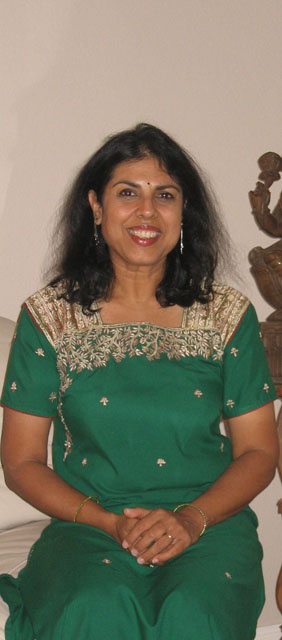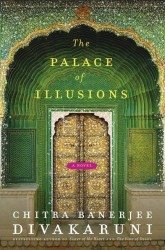Chitra Banerjee Divakaruni:
Balladeer of Immigrant Dreams

[dropcap]I[/dropcap]mmigrant journeys begin with a single, drastic step – the act of leaving home and one’s set place in it, of leaving the safe confines of the magic circle, the ‘Lakshman-rekha’, for unknown lands. In these new worlds, immigrants readjust and reinvent themselves, struggling to find their place in an alien landscape, netting some gains but also incurring deep emotional losses.
Noted author and poet Chitra Banerjee Divakaruni, herself an immigrant, has become the balladeer of the Indian Diaspora, chronicling the struggles, the losses and the tales of reinvention and redemption. She has put into words what millions of immigrants would find hard to articulate, especially the dilemmas faced by women who move from the confines and traditions of home into the brave new universe outside.
“Beautifully told stories of transformed lives…Both liberated and trapped by cultural changes on both sides of the ocean, these women struggle fiercely to carve out an identity of their own” wrote the San Francisco Chronicle of ‘Arranged Marriage’, Divakaruni’s first book of short stories which won the American Book Award, the Bay Area Book Reviewers Award and the PEN Josephine Miles Award for fiction.
All this was very far from the mind of Divakaruni when she was growing up in Calcutta, in a traditional middle class Bengali family. “Although at that time I had no thoughts of becoming a writer, I was no doubt influenced by all the literature in our house,” she recalls. “We were all voracious readers – I read many Bengali authors at that time that later became inspirations for me – Tagore, Sarat Chandra, Mahasweta Devi, and Ashapurna Devi.”
[dropcap]D[/dropcap]ivakaruni came to the US in 1976, as a student, working odd jobs and earning a Master’s degree from Wright State University in Dayton, Ohio, and later, a Ph.D. from the University of California, Berkeley. Slowly, she percolated her experiences and those of immigrants around her into elegant stories of strangers in a strange new world.
“As a woman and an immigrant myself, I have obviously experienced or at least observed many of the challenges, problems and the gains of immigration that I write about,” says Divakaruni.“Writing is an important way for me to try and understand the world around me. It has given me an insight into America and into India that I would not have had otherwise.”
Her work has been included in over 50 anthologies, including Best American Short Stories, The O’Henry Prize Stories, The Pushcart Prize Anthology, and ‘The Mistress of Spices’ was on several Best Books lists, including the San Francisco Chronicle’s 100 Best Books of the 20th Century.
‘Arranged Marriage’ was the forerunner of many novels including ‘Sister of My Heart’, ‘The Unknown Errors of Our Lives’, ‘The Mistress of Spices’, ‘Vine of Desire’, and ‘Queen of Dreams’. A thread running through all these stories is the choices made by immigrant women, their relationships and their difficulties and this strikes a chord with many readers.
[dropcap]“W[/dropcap]omen readers tell me that the books speak to their experiences,” says Divakaruni. “Many times they come up after readings and say, ‘This is my story–how did you know it?’ Often younger 2nd generation women and men will say the books have helped them understand the immigration experience of their parents and why they hold certain beliefs. I am glad to see that many men are reading my books, too. I think it is extremely important for us as human beings that we read across gender.”

[dropcap]“M[/dropcap]y beliefs about women’s roles are very simple: that women should be respected, that they should be given choices, and allowed the means so that they can follow their choices and dreams,” she says. “Writing is an important way for me to share these beliefs with people, and I certainly hope that men and women reading my books will at least consider the importance of these things.”
Indeed, Divakaruni takes her feminist beliefs off the printed page into real life too. She is the co-founder of Maitri, a women’s advocacy group in California and has worked for many years with women in situations of abuse. She is also on the advisory board of Daya in Houston, and is involved in Pratham, an NGO which works to eradicate illiteracy in India.She says, “I believe that education – of boys and girls – is a key component in changing negative attitudes towards women.”
A poet who became a writer, Divakaruni has written beautifully lush works of poetry including ‘The Reason for Nasturtiums’, ‘Black Candle’, and ‘Leaving Yuba City’ which won a Pushcart Prize, an Allen Ginsberg Prize and a Gerbode Foundation award. Her lyrical prose style evokes vivid images for the reader, and two of her books have been made into films: ‘The Mistress of Spices’ by Gurinder Chadha, starring Aishwarya Rai, and ‘Sister of My Heart’ became a popular Tamil TV serial by Suhasini Mani Ratnam.
Says Divakaruni of working with these two film-makers: “They are strong women with powerful visions about what is important for women. They did all the work – I was only a consultant.”
 The stories told to her by her maternal grandfather in their home village have also proved a great storehouse of inspiration, not only for children’s books ( ‘Neela: Victory Song,’ ‘The Conch Shell’and‘The Mirror of Fire and Dreaming’ ) but also for her latest novel, ‘Palace of Illusions’ in which she used the rich tradition of Hindu epics to create a powerful re-telling of the Mahabharata from a feminine perspective.
The stories told to her by her maternal grandfather in their home village have also proved a great storehouse of inspiration, not only for children’s books ( ‘Neela: Victory Song,’ ‘The Conch Shell’and‘The Mirror of Fire and Dreaming’ ) but also for her latest novel, ‘Palace of Illusions’ in which she used the rich tradition of Hindu epics to create a powerful re-telling of the Mahabharata from a feminine perspective.
Besides writing, Divakaruni derives great pleasure from teaching creative writing at the University of Houston, one of the most highly rated programs in the US. She says, “It is something I enjoy greatly, but apart from that, I learn so much from the process of teaching, of grappling with so many writing issues every week.”
Divakaruni’s life revolves around her work, her husband Murthy and two sons, Anand and Abhay (who have lent their names to characters in her children’s novels). They live in Houston during the school year and generally travel to California during summer to be with friends. “I live a rather quiet life by choice – my writing, teaching, family, community work and daily meditation are all important to me,” she says.
“I try to simplify other aspects of my life so that I can save time and energy for writing. Our dog Juno is a wonderful restful presence. She lies next to me for hours while I write. I think she, too, gives me inspiration! When I get stuck, she takes me for a walk and helps clear my head.”

An intrepid documenter of the human condition, Divakaruni translates the experiences swirling around her into fiction which is at its heart very universal. As The Denver Post noted about her work, “The search for identity and a sense of emotional completion is not confined to small corners of the world. It is a dilemma that all readers can understand.” Little wonder then that her books have been translated into 13 languages, including Dutch, Hebrew and Japanese.
Ask Chitra Divakaruni if she feels that the immigrant journey has become commonplace today, and she responds: “No journey is commonplace. Each person’s journey is unique and changes that person in a special way. I hope I am able to show that through my different characters.”
Text © Lavina Melwani
Photo credit: Anand Divakaruni
